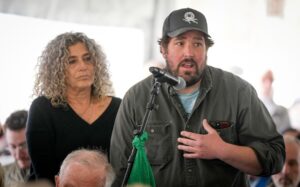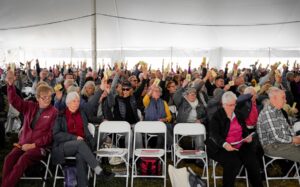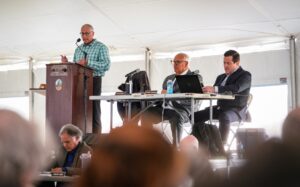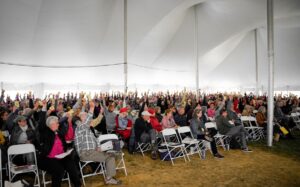TRURO — Last weekend’s town meeting marathon saw overwhelming support for multi-pronged efforts to build affordable housing. But when it came to plans to upgrade a dept. of public works facility, voters wanted almost none of it.

After two days of discussions on a new DPW site and whether to fund the engineering and construction costs of a revamped facility, voters gave the town permission to take a small step forward, approving a $2.8-million borrowing authorization to fund engineering costs for the facility at a site anywhere other than 340 Route 6, the parcel chosen for it by the select board.
The 12-hour special and annual town meeting doubleheader involved a total of 57 articles — 15 on the special town meeting warrant and 42 on the annual. Voters flew through some articles and dwelled on others; a $1.5-million budget override for an HVAC system repair at Truro Central School sailed through, while a discussion on how to use the town’s free cash lasted for over an hour.
The town meeting endorsed the recommendations of the Walsh Property Community Planning Committee by a landslide. The recommendations lay the groundwork for a future housing development on the Walsh property, which the town purchased five years ago.
Voters also approved the town’s acquisition of the Truro Motor Inn by eminent domain to be rehabilitated for affordable housing.
Three bylaws related to regulating short-term rentals and prohibiting fractional property ownership were also approved. The measures closely follow articles passed at Provincetown’s special town meeting last October.

Voter turnout was high, as expected, on Saturday, May 4. A sea of 632 Truro residents showed up for the special town meeting, which concluded by midday. A dozen or so more trickled in to bring the total to 647 for the annual town meeting, almost double the number who attended last year’s town meeting. Annual town meeting stretched until 4 p.m. on Sunday, May 5, but by the end of the weekend only 364 voters remained.
Progress on Housing
The first article to pass on Saturday was a nonbinding resolution supporting the 18 recommendations laid out by the Walsh property committee, which outlines the construction of 160 units on the 70-acre property. Around 40 percent of the acreage will be developed for housing, while the rest will be open space. The first phase of development will involve the construction of 50 to 80 units.
“Growing up here, there was a real sense of community. This community is fading,” said committee member Morgan Clark in support of the article.
Directly after Clark spoke, Jon Slater moved to indefinitely postpone the article. That motion quickly failed. Immediately after, Karen Ruymann moved to have the Walsh vote taken by secret ballot. Her motion also failed.

The article passed with a large majority. Together with a subsequent article to establish a new Walsh advisory committee, development plans for the property will now move forward.
Voters also overwhelmingly approved an article to take the Truro Motor Inn by eminent domain. The property, from which all the tenants have now been evicted, has been appraised at $1.6 million, according to town officials. The cost of the taking would be covered by Dennis Family Gift Account funds and Affordable Housing Trust funds. The transaction will also be subsidized by $50,000 in back taxes the Delgizzi family owes the town for the property.
“The Truro Motor Inn has been a problem for years,” said select board member Stephanie Rein. “The taking by eminent domain is the next logical step.”
Voter Jack Riemer opposed the use of the property for housing. “We all know we need housing, but we also need business owners here,” he said.
Town meeting approved Brian Renard’s amendment to strike language from the article that would authorize the conveyance or lease of the property to a third party. Town counsel John Giorgio of KP Law said he had recommended the language. Without it, a lease conveyance would have to come back to town meeting, Giorgio said.

Voters also passed three articles that regulate short-term rentals and prohibit fractional property ownership. Article 32 forbids corporations from holding short-term rental certificates. Article 33 limits the number of short-term rental permits to two per person, and Article 34, a zoning bylaw amendment, prohibits fractional ownership, also known as timeshares.
Another article approved at the special town meeting allows the construction of duplexes by right and reduces the minimum lot size for duplexes from one acre to 33,750 square feet. One unit must have a year-round lease, and the other must either be owner-occupied or have a 12-month lease.
“It is probably going to have a small impact, but a huge impact on the family that gets to live there,” said Kevin Grunwald, chair of the housing authority and a candidate for select board.

Article 37 on the annual town meeting warrant permits “attainable housing,” intended for residents earning no more than 100 percent of area median income, to be built on undersized lots. According to the warrant, the bylaw would apply to “approximately a dozen properties.”
Voters turned down only one housing-related article. By an overwhelming majority, they rejected a $6.1-million borrowing authorization to purchase 24 acres at 2 Sand Pit Road. Known as the Noons property, it would have been used “for any lawful municipal purposes,” including housing.
A Penny for DPW
There was consensus among town meeting voters on May 4 and 5 that the current DPW facility on Town Hall Hill is outdated and needs replacing. But the question of how to move forward proved chaotic.

Three separate articles at Saturday’s special town meeting first confronted the question. Article 2 asked to locate the new facility at 340 Route 6 next to the police and fire stations. Article 3 would have provided $28.3 million for engineering and construction costs for the facility. And Article 4 — a stopgap measure — would have funded only the engineering costs in case Article 3 failed.
But all three articles failed. Voters expressed concern about the effect that the 340 Route 6 site would have on traffic. Conservation commission member Diane Messinger said that the clearing of an “undisturbed piece of land” would harm habitat there. “A box turtle was just discovered,” Messinger said.
When Article 4 came around, Michael Forgione said it didn’t make sense to fund construction and engineering costs without a determined location for the facility. “You cannot do a ground field test without a field,” he said.
Town officials had a second chance to persuade voters to move the project forward. The next day, voters discussed Article 13 on the annual town meeting warrant, which mirrored the previous day’s construction and engineering cost articles with a $28 million borrowing authorization.
But while DPW Director Jarrod Cabral was waiting in line behind other voters to make his case, former Building Commissioner Russ Braun offered an amendment that would cut the authorization to 10 percent of the proposed amount: only $2.8 million. That money would be used solely for the engineering costs of a new facility “predominantly at the Town Hall Hill site, excluding the 340 Route 6 site,” Braun’s motion stated.

The select board responded favorably to Braun’s motion. “People should be welcoming the opportunity to study the Town Hall Hill site,” said the board’s Bob Weinstein.
Select board vice chair Sue Areson agreed. “While it excludes the 340 Route 6 site,” she said, “it doesn’t exclude other sites.” Braun’s motion passed.
Cabral later told the Independent that he and the building committee did not give a formal presentation because the meeting took place under a tent without the option to show slides.
Budget Hawk Hour
Annual town meeting’s Article 3, which outlined $2.9 million worth of free cash transfers for fiscal 2025, was the most time-consuming of the weekend. The town’s budget had been in the works since October, Finance Director Alex Lessin told the Independent, but on Saturday afternoon and Sunday morning, budget hawks pulled it apart line item by line item.

When Forgione asked where free cash comes from, Lessin replied, “I did write a newsletter article in June 2022 that I’m sure my mother has read.”
Discussion centered on the value of a senior needs assessment, technology upgrades, and planning expenses related to the public water supply.
Clint Kershaw moved to separate four budget items “to be dealt with individually” along with four projects in one capital improvement line item.
Kershaw asked about the purpose of the senior needs assessment, noting that it came from the select board and not the council on aging.
“If anyone has tried to get a home health aide to come to Truro to care for an elder, it’s almost impossible,” said the select board’s Rein. “I think $30,000 is a small sum to understand how we can support not only our seniors but the caregivers that take care of them.”
Tim Hickey, a candidate for select board, proposed an amendment slashing the senior needs assessment from the free cash article. “It appears that there is a $30,000 frivolous study being done,” he said. His amendment passed.

“I think it’s amazing that we are spending this kind of time on minor parts of the budget, which is a document that you could have commented on over months,” said Morgan Clark 40 minutes into Sunday’s reconvened meeting.
A motion to move the question finally passed by midday. After the meeting voted to approve the free cash transfers, Bob Higgins-Steele moved to reconsider the article to reduce a climate resiliency effort support line item from $50,000 to $10,000. His motions passed.
In what was the closest vote of the weekend, voters approved an article allowing Truro to hold future town meetings in other towns. Locations from Provincetown to Orleans are now legal as a last resort, eliminating the need for another $75,000 rental of a heated tent, 1,000 chairs, and an outdoor audio system.
When annual town meeting was adjourned at 3:36 p.m. on Sunday, cheers erupted, and the crowd rose in a standing ovation.



